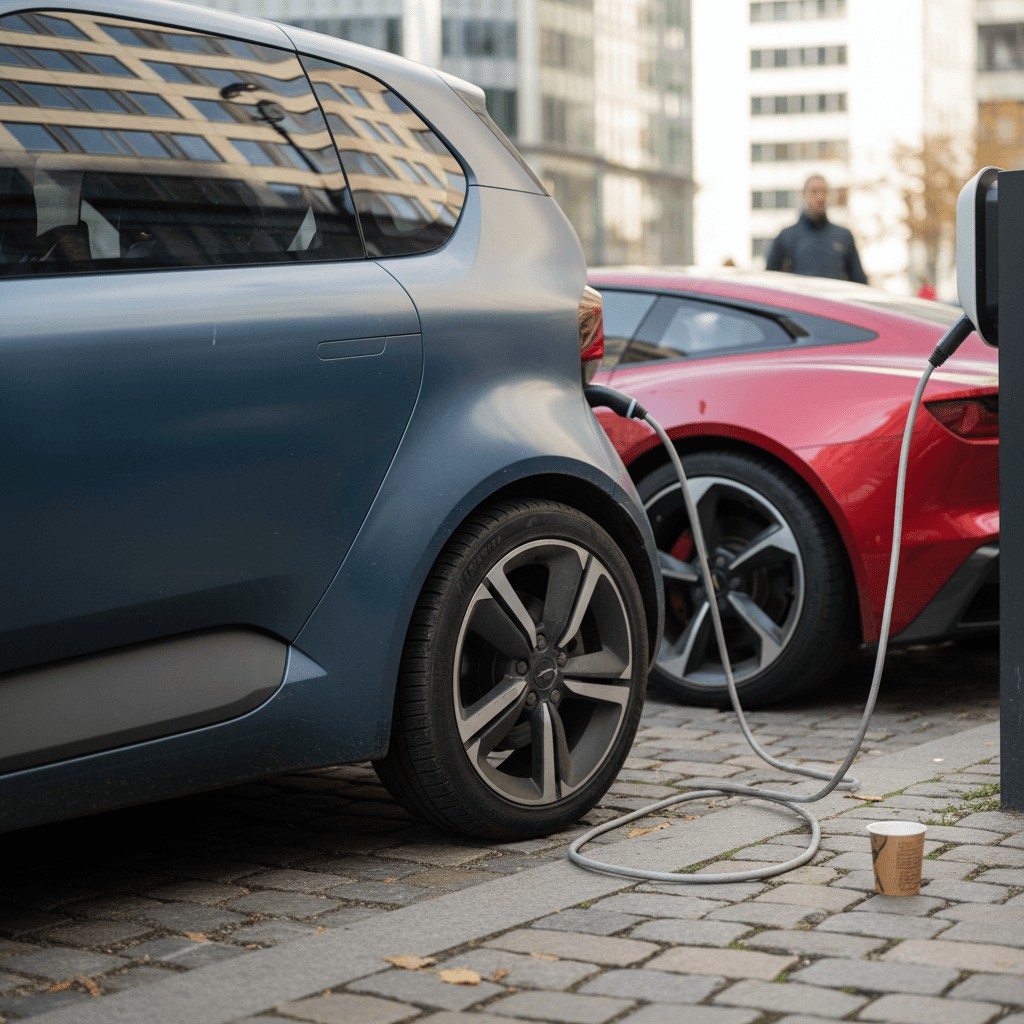You’re not alone if you’ve wondered, “Are EVs actually cheaper than gas cars?” With gas hovering around $3 a gallon in 2025 and electricity prices creeping up, the answer isn’t as simple as it sounded a few years ago. The good news: when you look at real-world fuel and maintenance costs, EVs are still cheaper to run than gas cars, but whether they’re cheaper to own overall depends on what you buy, how you drive, and whether you shop new or used.
Key idea
Are EVs Cheaper Than Gas? The Short Answer
EV vs Gas: Big-Picture Cost Signals for 2025
Recent cost-of-ownership data shows that EVs are clearly cheaper to operate (fuel plus maintenance) than comparable gas vehicles, but when you add higher purchase prices, insurance, and financing, brand-new EVs don’t always come out cheaper over the first few years. A 2025 AAA analysis of multiple vehicle types found that all‑electric models have significantly lower running costs but higher total annual ownership cost than many gas or hybrid models when purchased new and driven 15,000 miles a year.
Where EVs start to look very compelling is when you:
- Buy a used EV that’s already absorbed most of the depreciation
- Drive 10,000–15,000+ miles per year
- Do most of your charging at home or work, not on expensive DC fast chargers
How Total Cost of Ownership Really Works
To answer whether EVs are cheaper than gas cars, you have to look beyond the monthly payment. What really matters is Total Cost of Ownership (TCO) over the time you’ll keep the vehicle. For most buyers, that means 5–10 years.
- Purchase price (or lease/finance payment)
- Taxes, registration and dealer fees
- Fuel or electricity
- Maintenance and repairs
- Insurance
- Occasional extras (emissions testing for gas, parking fees, toll tags, etc.)
- Resale value or trade-in value when you’re done
An EV may cost more up front but less to run. A gas car may be cheaper to buy but more expensive to feed and maintain. The only honest way to know which is cheaper is to run the numbers for your situation, which we’ll show you how to do below.
Fuel Costs: Electricity vs Gasoline in 2025
Let’s start with the most visible expense: fuel. In 2024, U.S. drivers paid about $3.30 per gallon of regular gas on average, and forecasts for 2025 hover around $3.10 per gallon. Meanwhile, average residential electricity rates are roughly in the mid‑teens per kWh nationally, though they vary widely by state.
Example: Typical EV
Assume:
- Efficiency: 3.3 miles/kWh (about 0.30 kWh/mile)
- Home electricity: $0.16/kWh (rough U.S. residential average in 2025)
- Miles driven: 12,000 per year
Cost per mile:
0.30 kWh × $0.16 = $0.048 per mile
Annual “fuel” cost:
12,000 × $0.048 ≈ $576/year
Example: Comparable Gas Car
Assume:
- Fuel economy: 30 mpg
- Gas price: $3.10/gal
- Miles driven: 12,000 per year
Cost per mile:
($3.10 ÷ 30) ≈ $0.103 per mile
Annual fuel cost:
12,000 × $0.103 ≈ $1,236/year
Fuel savings in plain English
If your local electricity is very expensive (think parts of California or the Northeast) and gasoline is relatively cheap, the advantage narrows. But for most U.S. households paying something around the national average per kWh and driving 10,000–15,000 miles per year, an EV’s fuel bill is still roughly half that of a comparable gas car.
Maintenance and Repairs: Where EVs Really Shine

Maintenance is the quiet budget killer for many gas cars, especially as they age. EVs avoid a long list of routine items: oil and filter changes, spark plugs, timing belts, transmission fluid, complicated exhaust systems, and emissions tests in many states. You still have to pay for tires, cabin filters, brake fluid and alignment, but there’s less to wear out.
Common Maintenance: EV vs Gas Car
Why EVs typically spend less time and money in the shop
Electric Vehicle
- No oil changes or engine tune‑ups
- Brake wear is reduced thanks to regenerative braking
- Single‑speed transmission with fewer service needs
- Software updates often done over the air
Big-ticket risk: Out‑of‑warranty battery pack repairs on very high‑mileage or poorly maintained cars.
Gas Vehicle
- Regular oil and filter changes
- Engine tune‑ups, spark plugs, timing belts/chains
- Transmission services and potential major rebuilds
- Exhaust system, catalytic converter, emissions repairs
Big-ticket risk: Engine or transmission failure on older, high‑mileage cars.
Used EV advantage
Real‑world data from multiple fleet studies and insurers suggest that EV maintenance costs are roughly 30–40% lower over the vehicle’s life compared with similar gas models. You may spend a bit more on tires (instant torque and heavier curb weights can wear them faster), but you usually come out ahead overall.
Purchase Price, Incentives, and Financing
Here’s where things get more complicated. In 2025, new EVs often carry a higher sticker price than comparable gas models, especially in popular crossover and pickup segments. At the same time, the federal EV tax credit of up to $7,500 is scheduled to end for most purchases after September 30, 2025, unless you locked in a qualifying binding contract beforehand.
Important 2025 policy shift
New EV vs New Gas Car
- New EVs still tend to cost more up front than equivalent gas models.
- Once you include financing, insurance and faster depreciation, a brand‑new EV may or may not save you money in the first few years.
- If there’s no tax credit available, the break‑even point may move several years out.
Used EV vs Used Gas Car
- Used EVs have already taken their biggest depreciation hit.
- On the used market, especially for 3–6‑year‑old models, prices for EVs and gas cars are often much closer.
- That means you get the fuel and maintenance savings without paying as big of a premium up front.
That’s why platforms like Recharged focus on used EVs with transparent battery health and fair market pricing.
Financing tip
Insurance, Registration, and Extra Fees
On the insurance side, EVs can sometimes be a bit more expensive to insure than equivalent gas cars. They’re packed with advanced electronics and, in some cases, higher‑cost body repairs. However, not every model is pricey, and safe‑driver discounts or usage‑based policies can help level things out.
- Some states charge extra EV registration fees to recover lost gas‑tax revenue.
- You may avoid emissions testing fees that gas vehicles still pay in certain regions.
- Parking discounts or HOV‑lane access for EVs can save time or money in select markets, though policies continue to change.
Net effect
Resale Value, Battery Health, and Used EVs

Resale value is the wild card in any EV cost comparison. Over the last few years, EV resale values have been hit by rapid improvements in new‑car range, changing incentives, and aggressive price cuts from some automakers. That’s painful if you bought new, but it’s an opportunity if you’re buying used.
Why Battery Health Matters So Much
It’s the most expensive part of the car, and the key to long‑term savings
Range and performance
Resale value
Risk reduction
How Recharged helps
When an EV Is Cheaper, and When It’s Not
Situations Where an EV Is Usually Cheaper Overall
You drive a lot of miles
If you’re driving <strong>12,000–15,000+ miles per year</strong>, the fuel and maintenance savings add up quickly. The more you drive, the more an efficient EV pays you back.
You can charge at home or work
Home charging at typical residential rates is usually far cheaper than gasoline. If most of your charging is done at home or at low‑cost workplace chargers, EV math looks very good.
You buy used instead of new
A 3–6‑year‑old EV often costs similar money to a comparable gas car but still delivers lower running costs. That’s where the total cost of ownership can meaningfully favor EVs.
You live in a high‑gas‑price state
In places where gas regularly sits well above the national average, EVs enjoy an outsized fuel‑cost advantage, even if electricity is a bit higher too.
You plan to keep the car 5–10 years
The longer you keep the vehicle, the more time you have to recoup any purchase‑price premium through cheaper fuel and maintenance.
Situations Where a Gas Car May Be Cheaper
You drive few miles
If you only drive <strong>5,000–6,000 miles per year</strong>, the fuel savings from an EV are modest. A simple, inexpensive gas car can be cheaper to own overall.
No home charging available
If you rely heavily on <strong>public DC fast charging</strong>, your electricity cost per mile can approach, or sometimes exceed, gasoline costs in your area.
Higher purchase price with no incentives
If the EV you’re considering costs thousands more than a comparable gas car and there’s no tax credit available, your break‑even point may sit beyond how long you plan to keep it.
Specialized work or towing needs
If you frequently tow heavy loads long distances in areas with limited charging infrastructure, today’s EV trucks may be less convenient and more expensive to run.
How to Run the Numbers for Your Situation
You don’t need a Ph.D. in economics to figure out whether an EV is cheaper than gas for you. You just need a few realistic inputs and a calculator. Here’s a simple framework you can use today.
Key Inputs for Your EV vs Gas Cost Comparison
Gather these numbers before you start comparing vehicles.
| Category | Gas Car Question | EV Question |
|---|---|---|
| Annual miles | How many miles do you realistically drive each year? | Same question, this drives your fuel and maintenance savings. |
| Fuel/energy cost | What’s your mpg and local gas price? | What’s the car’s kWh/mile and your electricity rate at home/work? |
| Purchase price | What will you actually pay out‑the‑door? | Same here, and note any remaining tax credits or rebates. |
| Financing | What’s the APR and term on your loan or lease? | Same, compare total cost, not just the monthly payment. |
| Maintenance | What does your mechanic estimate for routine service? | What does the EV’s maintenance schedule look like? (Often lighter.) |
| Insurance | What are quotes from your insurer for each vehicle? | Some EVs cost more to insure, get a quote before you buy. |
| Resale value | What will this gas car be worth in 5–7 years? | What will this EV be worth then, assuming good battery health? |
Estimate each item over the number of years you expect to keep the vehicle (commonly 5–10 years).
Practical next step
If you’re looking at a used EV, a battery‑health report is crucial to making the math honest. That’s why every vehicle at Recharged includes a Recharged Score Report, so you can see how much useful life is likely left in the pack before you commit.
FAQ: Are EVs Cheaper Than Gas Cars?
Common Questions About EV vs Gas Costs
The Bottom Line: Should You Switch to an EV?
So, are EVs cheaper than gas cars? They often are, especially when you buy used, drive a healthy number of miles, and charge mostly at home. Lower fuel and maintenance costs are baked into the technology. But like any major purchase, the answer ultimately comes down to your driving habits, local energy prices, and the specific vehicles you’re comparing.
If you’re EV‑curious but worried about costs, focus on total cost of ownership instead of just the sticker. Compare a used EV with verified battery health against a similar used gas car, and run the math on payments, fuel, maintenance and resale. That’s exactly the kind of decision Recharged is built to help with, offering battery‑health diagnostics, fair market pricing, financing, trade‑ins and expert guidance from start to finish. Get the numbers on your side, and you’ll know whether your next car should still sip gas, or start running on electrons.



